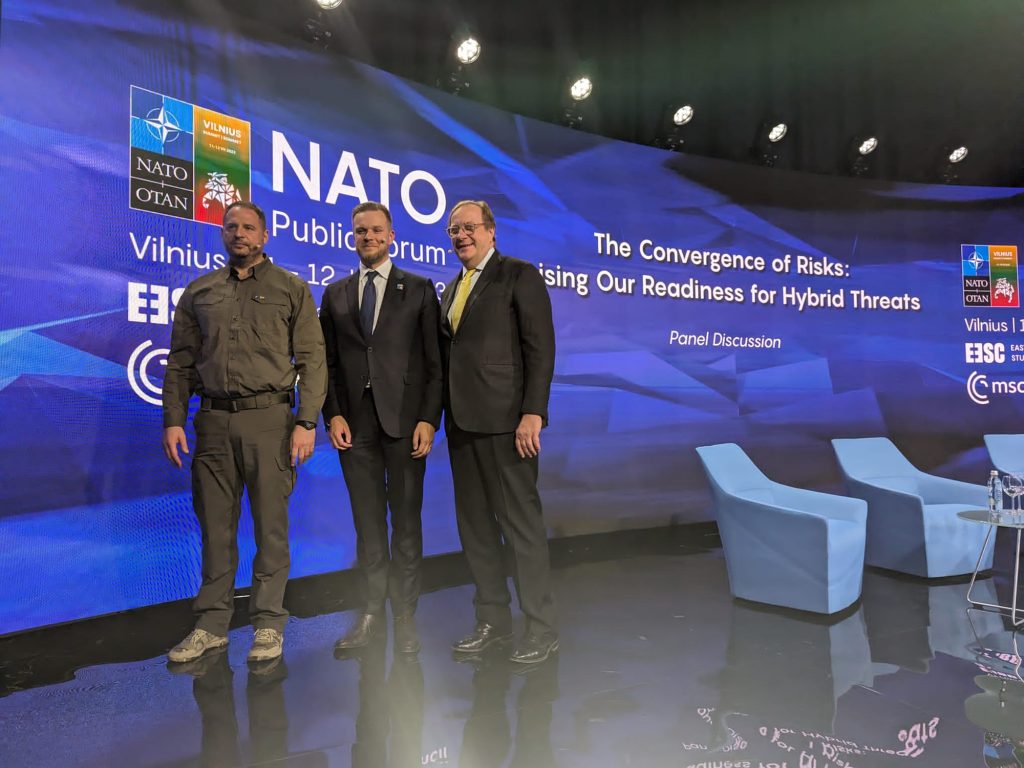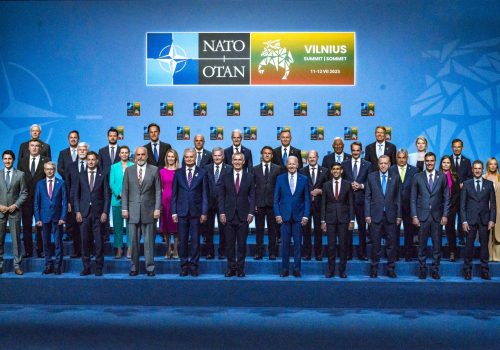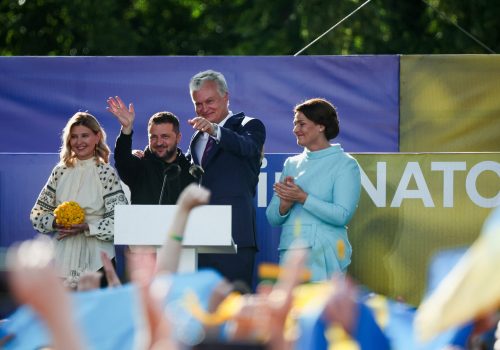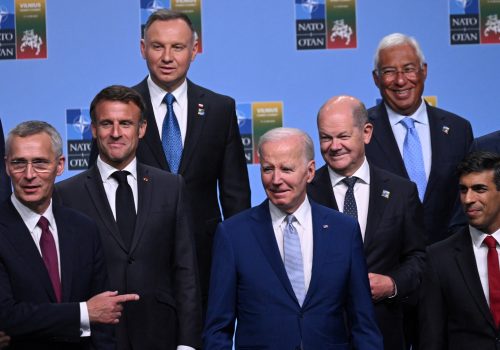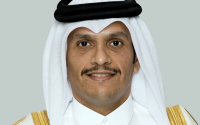
Ukraine’s Andriy Yermak and Lithuania’s Gabrielius Landsbergis on the path ahead for Ukraine to join NATO

Watch the event
Event transcript
Uncorrected transcript: Check against delivery
Speaker
Andriy Yermak
Head of the Office of the President of Ukraine
Gabrielius Landsbergis
Lithuanian Minister of Foreign Affairs
Moderator
Frederick Kempe
Director and CEO, Atlantic Council
FREDERICK KEMPE: So, Mr. Yermak, how wonderful to see you; Minister Landsbergis. Because the [NATO-Ukraine Council] is about to start and because of the bravery and courage that you’ve shown Ukraine, we actually think we’re going to throw protocol to the wind and turn first to you.
And I wonder if you could talk about—I was with you not so long ago, a few weeks ago, with President Zelenskyy in his office during a time of attacks, and President Zelenskyy said if he didn’t get what he wanted at the NATO Summit, that he wouldn’t come because he would consider it a betrayal to the Ukrainian people. So he came. He hasn’t gotten entirely what we wanted. We read that in his Twitter feed. Give us your feeling of why he decided to come.
And then some people argue the communiqué was a prudent outcome. NATO doesn’t want to go to war with Ukraine. Others call it a missed opportunity. I’d love to have your view.
ANDRIY YERMAK: Thank you very much.
First of all, of course President Zelenskyy, president of Ukraine, [came] to Vilnius because it’s important to be here and to be the partners, to be the alliance. And first of all, the unity of NATO and the support which we really received during [the] more than five hundred days of this war, it’s a very, very strong signal to the aggressor that—first of all, that [the] Alliance and partners not just believe, they’re sure about our victory. The second, let’s see, it’s [that] today, it’s not finished. And we are looking for some very serious results of the summit.
And of course, our president, he’s a very principled person. And of course, everything which he said before and our estimate and our feelings you can listen, you can see he is very honest, he is always very clear, declared on the position of our country. But let’s see. We really will have in several minutes starting this very important, the—I think the maybe most important for Ukraine—meetings with the NATO alliance in which we will discuss, first of all, of course, the [continuation] of the military aid, which [is] very important for us to win this war, and of course we will continue—and I hope it will be today—one very important moment for the security guarantees for Ukraine and the way to be a member of NATO.
FREDERICK KEMPE: And just a quick follow-up, then, on that. In this balance between prudent outcome/missed opportunity, are you saying it all depends on how things go from now? Because if you had listened to President Zelenskyy’s or read President Zelenskyy’s tweet from yesterday where he’s calling the language about Ukraine and NATO absurd, it seems to me that this is a movement in another direction, though.
ANDRIY YERMAK: I hope that this summit [will not] be the missed opportunity, but once again you can… listen and see in the result of this day. We have very positive bilateral [meetings] already with some partners and… the positives of the results from this summit.
FREDERICK KEMPE: Thank you. And then just finally, how has it been received in Ukraine thus far?… This summit and the outcomes, how are Ukrainians receiving this and responding to it inside Ukraine?
ANDRIY YERMAK: You know, we have more than [five hundred] days of war. And you know, all [of] us in Ukraine, we are living in very specific reality, the reality of the war. And of course, Ukrainians looking for this summit and for the results, very concrete things. And of course, you know in these seconds, these minutes, our heroes continue to [fight]. For us, sometimes these days it’s [a] very special atmosphere because here at peace, here the silence, here is not you listen—not listen the sirens. And you personally and my colleague and friends personally can see this reality in Ukraine.
But you know, our nation [shows] all these five hundred days how we are brave, how it’s possible to not be afraid, how it’s possible to fight for independence, for freedoms. And of course, we hope that today’s results of this summit will be more inspired and give not just emotional, some very practical support of our people for our soldiers to go forward.
And I’d like to say very important things: that we [are] not stopping our [fight]. No [forces] exist [that] can stop us until we [liberate] all our territories, we back all our people, and really win this war. And I absolutely sure that this will be our joy and victory.
FREDERICK KEMPE: So, Mr. Yermak, I think that’s a great transition to the prime minister. Having been with you recently in Kyiv, I slept a lot better at night because of Patriot missiles. Here I can sleep well at night not because of the Patriot missiles that are out there right now for your airport.
Minister Landsbergis, I followed your history [for] a long time. I was here when you were in the Warsaw Pact and in the final days and at the time of the Vilnius 10 ahead of your 2004 membership. Talk about this summit in the context of history, but also how you think history might remember this summit.
GABRIELIUS LANDSBERGIS: Well, that’s an excellent question. We tend to look at Vilnius and Vilnius summits in a way that they sometimes do not offer a tactical change, but they offer strategic opportunity. And it happened in 2014, when tactically at that day, some of us felt that we might not have won the day, but at the end we won Ukraine and Ukraine has won.
I believe that something of that [sort] is happening these days, that quite a lot of those here in this room and in this country expected more that happened today. But I think that in strategy—strategically, we won. We committed ourselves to Ukrainian membership in NATO. That’s the biggest achievement, I would say, strategically.
Now, where the problem lies. The way that I look at history, the promise in Bucharest, it was a strong statement: Georgia and Ukraine will become members of NATO. It was a strong statement. The problem was not with the statement itself; it was with our lack of commitment afterwards. We did not come back. We came back to the statement three invasions later. That was a problem. So now I’m quite sure that we are committed that we won’t waste another year, another month, and another day staying on the question and doing everything in our power so that we stay true to the meaning that we put into the declaration.
And that means that Vilnius Summit was not the last stop. We have to see it as a bridge. And the next stop is Washington. So we still have a full year. Lots to do. And I count on every single one of you to do your part so that Washington can actually be even more historic than Vilnius.
FREDERICK KEMPE: Thank you for that. And it being the seventy-fifth anniversary, I hope that’s true.
A follow-up question on that. Some say the actual communiqué language, because of how conditional it was made, is weaker than 2008 in Bucharest. But am I interpreting weaker language but stronger commitment toward the goal?
GABRIELIUS LANDSBERGIS: Yeah. I was not there in the room in 2008, unfortunately, so I’ve just read about it and I was told about it. I think that the way it is being presented, that the consensus in 2008 was weaker, it was not there. Now it’s much wider, definitely. You don’t see an objection, you know, from the people in the room who would say Ukraine should not be part of NATO, we cannot commit ourselves to that idea. There is nobody saying that. So that is a step forward.
Again, you know, coming from [the] eastern flank, we tend to see the situation a tiny bit different. And for us, actually, the history has changed since the last year. That’s why our wording is stronger. That’s why our stance is stronger. That’s why our support to Ukraine, you know, is more vocal, because for us the history runs a different course right now.
And I tend to use the example of [the] Berlin Wall. I think it’s a very monumental time in European history, in world history, in 1989. So for us, last year the wall [was] rebuilt or it’s being rebuilt. So basically, in that principle, we’re back into—for us, it’s cold war. For Ukraine, it’s hot war. But we’re back in 1989 and going backwards.
So this is where our mentality is. This is how we see the situation. And therefore, we are building on a different reality than it was in 2008.
FREDERICK KEMPE: So we all know that an alliance has to balance the long term and the short term. We also know that—and Jake Sullivan was talking about that earlier today—unity doesn’t mean you don’t disagree. And press reports have it that at least eight countries of the thirty-one were fighting very hard for different language, stronger language toward invitation for Ukraine… Where is the alliance unified? Where is it un-unified? What is the crux of the differences in the room?
GABRIELIUS LANDSBERGIS: I would say in some cases there is difference in horizon. We tend to see that problems that we are trying to solve, the way that we’re helping Ukraine, the way that Ukraine should be helped, we’re talking decades of a new reality in Europe and decades of Putin, who’s still in power, who will be a dangerous neighbor, who might attack again, who might assault other neighbors, even try Article 5, how that works. We are thinking in this term. It might not happen next year. In some cases, the horizon is way shorter—way, way shorter. We’re talking years; in some cases, it’s months. How do we survive this month? How do we survive until next year? How do we survive until the next election?…
FREDERICK KEMPE: One more question for you, then I want to go back to Mr. Yermak. The Baltic aerospace agreement, in all the reporting about everything else, very little has been [placed] on this. And then put that in the context of Swedish membership. Obviously, this was the big success of this week, in many respects unanticipated. Put together this Baltic aerospace agreement, the Swedish membership; how does that change your region? How does it change security around the Baltics and Lithuania?
GABRIELIUS LANDSBERGIS: Well, I think that Swedish membership is monumental, definitely. If we, you know, remain on the example of a bridge, so it’s a pillar, definitely. It’s a very strong pillar.
And you know, the way that we frame it currently, the promise of swift accession—Swedish swift accession has been made, and now we’re very much looking forward to it. But it changes the situation in the Baltic Sea dramatically. It affects defense plans that are being voted for, that were adopted, but it changes them as well. Sweden is a very strong element in all of our defense—not just Lithuania, but also Poland, also—I mean, I’m not even talking about Sweden itself, but also Finland, also Estonia. The whole Baltic Sea, you know, becomes a different, different concept. That’s a very strong thing.
When it comes to the air defense, we’re saying that, look, we have to talk about the content. Things don’t happen overnight. So it’s a very strong step forward, but now we—will be looking for, you know, how it will be materialized.
FREDERICK KEMPE: Thank you for that.
Mr. Yermak, so not a prudent outcome, not a missed opportunity, but a bridge. What would you like to see this week’s events in Vilnius be a bridge to on behalf of Ukraine? You talked about Washington. What do you hope will happen between now and Washington?
And obviously, we have a spring offensive we’re talking about at the same time. So there are two battles, one of them very real and on the frontlines for Ukraine against the aggressor, Putin’s troops, and the other is the bureaucratic contest in NATO of where we want to land by next summer in Washington.
ANDRIY YERMAK: First of all, I hope that during this period of time we will win this war. This is—will be, first of all, the most important for us, and I’m sure will be very important for all the world.
The second, of course, as we are looking this way and to the Washington summit, of course, we will receive the fixed security guarantees, because security guarantees to Ukraine is the [guarantee] of the security of the whole Europe. And as I said, we hope that just today we will have very important stage of issue of the security.
And of course, I [agree] with my colleagues that we are looking [at] a bridge and we hope that—you know, during these five hundred days Ukraine a lot of times surprised everybody in the world.
First of all, we [were] surprised, when it started, this [invasion], and somebody gave us three days, one week, one month. We [were] surprised and we still not just defended, we liberated our lands.
The second, you remember [how] then President Zelenskyy, the speaker of the parliament, the head of the government [sent] the documents for the candidate states. Many people [were] very skeptical. We already received this status. We [were] talking about coalitions of our jets. We [were] talking about coalitions of tanks. We [were] talking about the coalitions of air defense. Already, it’s reality.
And I think that we try everything from our side to surprise in Washington. And of course, we are looking, finally, as how said President Erdoğan in his—in the last meeting with President Zelenskyy in Istanbul, that Ukraine [has] everything to be a member of the NATO. And of course, we believe in it.
And I’m glad that today we—I think nobody in the world don’t think that it’s happened. Of course, we’re looking for the prospective, for the future, but not hesitation that it’s happen.
And about—I’m sorry, about your second part of the—of the—I mean the reforms. And you know, in the beginning when Volodymyr Zelenskyy [went] for the presidential campaign in 2019, one of his [priorities] was the [reforming] of Ukraine. I can say it’s in our blood. And of course, I can say that [it] may be, will be difficult to find another country in the world who just, in the circumstances of this terrible war, [is] not stopping any reforms, and we go forward. And I think many people, and Ursula von der Leyen, and the European leaders many times said how really impressed by the reforms, which we continue doing just during this war.
FREDERICK KEMPE: So final question. We’ve run out of time, so final question for each of you, Mr. Yermak and then Minister Landsbergis. You have said, President Zelenskyy has said that strategic commitments can’t replace NATO membership. Do you still believe that? Strategic support.
ANDRIY YERMAK: Yes, of course. Yes, of course. Of course, it’s—you know, we are living in so region of life that immediately back to Ukraine we continue to do all the best from our side. That—just if somebody [has] some hesitations in the colleagues, there is [none], and to do and go forward and not stopping, because this is the goal and this is the [decision] of Ukrainian society. Today, more than 90 percent of Ukrainian [support] and believe that very soon Ukraine will be the members of the NATO.
FREDERICK KEMPE: Thank you, Mr. Yermak.
Minister Landsbergis, the bridge, Vilnius to Washington. How should that bridge be built?
GABRIELIUS LANDSBERGIS: I think that there are some very practical steps that could be taken and should be taken. First of all, there was a discussion about the need for additional reforms in Ukraine. At least this is what allies agreed upon. And Ukraine has shown a tremendous, unbelievable capacity to reform under duress. This has happened on the path to EU. So I think that if concrete requirements are being presented to Ukraine, I’m absolutely 100 percent convinced that Ukraine will deliver on those so that we could have, you know, to show up for the allies that—because the statement goes that when allies agree and the conditions are met. So I’m sure that Ukraine can deliver on part of [the] conditions.
FREDERICK KEMPE: So an invitation in Washington would be potentially possible, would be possible?
GABRIELIUS LANDSBERGIS: I’m convinced that it could be historic, not just because of the years.
FREDERICK KEMPE: I think that’s a good spot to end on. So let me thank Mr. Yermak not just for being here, but for the courage of your country. And please send our best wishes to President Zelenskyy and all Ukrainians.
And then, Minister Landsbergis, what wonderful hosts you’ve been. And what an incredibly well-executed and organized summit. We’ve been taken care of so well here by every citizen of this country.
Watch the event
Further reading
Tue, Jul 11, 2023
NATO summit leaves Ukrainians frustrated
UkraineAlert By Peter Dickinson
The 2023 NATO summit failed to deliver on hopes for a clear commitment on future Ukrainian membership, leaving many in Ukraine deeply frustrated by the apparent lack of urgency among the country’s allies, writes Peter Dickinson.
Tue, Jul 11, 2023
The NATO Summit’s underwhelming support for Ukraine
Fast Thinking By Atlantic Council
Ukrainian President Volodymyr Zelenskyy didn’t get his biggest wish: a timeline for Ukrainian membership in NATO. Our experts are here to decode the communiqué and its ramifications.
Tue, Jul 11, 2023
Experts react: What NATO’s Vilnius summit communiqué means for Ukraine and the Alliance’s future
New Atlanticist By Atlantic Council experts
Atlantic Council experts decode what the communiqué says about Ukraine’s membership, NATO’s approach to China, and more.
Image: Andriy Yermak, head of the office of the president of Ukraine, and Gabrielius Landsbergis, the Lithuanian minister of foreign affairs, speak in a conversation with Frederick Kempe, Atlantic Council CEO and president, on July 12, 2023.
